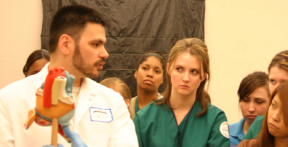If you had any doubts about whether to select the organ donor option on your drivers license, you simply needed to visit Tacoma Community College Friday to help make that decision.
Some 600 college and high school students from the South Sound signed up for TCCs annual Surgical Demonstration Day — a rare opportunity for students interested in medicine to learn and observe from TCC students presently studying human biology, anatomy, and cadaver prosection.
To be sure, the event was not for the squeamish. In one room — surrounded by medicine cabinets, anatomy posters, and medical instruments — three students in TCCs Biology Department meticulously carved away at a male cadaver: removing tissue, pointing out important physiological features, and sharing their insights with observers who crowded around the cadaver and jostled for a good view.
In a nearby building, the remains of another male cadaver — foot and lower leg; knee and upper leg; chest (including lungs and heart); and pelvis (including digestive, urinary and male reproductive structures) — were distributed throughout four different rooms. In one room, four students, including undergraduate Miguel Nunez, handled a cadavers heart and lungs for closer inspection.
Hes allowed us to help other people, said Nunez. According to Nunez, few community colleges use human cadavers in anatomy classes. When you are dealing with a cadaver, you learn so much. Books are fine, but theres nothing like dealing with the real thing. It really does stick with you.
Tim B. Keely, a faculty member in the schools Biology Department who teaches anatomy and physiology, agreed.
For an undergraduate student, this is an experience you wouldnt normally get, he said.
According to Keely, a surgical demonstration day in Tacoma dates back more than 70 years, when the Surgical Club of Tacoma hosted regular demos. We didnt want that to disappear when the surgical club faded away, said Keely, and the college pushed to host the event. Today, TCC receives one to two cadavers every couple years. The annual Surgical Day is supported by Multicare Health System (which provides financial support) and Madigan Army Hospital (which provides surgeons who donate their time to train TCCs student presenters).
Cadavers are not free, said Keely. We try to get the most work out of each one. The school also offers a cadaver prosection course, which grew from student interest some 15 years ago. On weekends, instructors would come in on weekends and prepare the cadavers, said Keely. Students got wind of it and asked, Can I help? At the time, there was no opportunity for students to earn college credit while helping to prepare the cadavers. Hence, the prosection course was created.
The college takes great pains to protect the identities of the cadavers. Anonymity is big, said Keely. People who donate their bodies are usually from local areas. During the demonstration Friday, heads were either covered or removed.
Afterward, evening degree students from Clover Park Technical Colleges Health Unit enthusiastically praised the event.
I had to separate the fact that it was a real person, said May Price, who admitted she was a bit squeamish at first. But it was very educational.
I understand it a lot more now, said Patricia Kim, another CPTC student.








